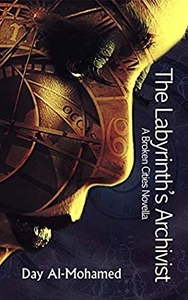Are you looking for a book with a diverse cast, compelling story, great worldbuilding, and disability representation? Lucky you, because you have The Labyrinth’s Archivist.
This fantastical novella stars Azulea, the newest in a long line of Archivists, the people who interview travelers and make maps of the worlds that extend out from the Archivists’ Residence. Azulea desperately wants to join her family’s vocation, but she is blind and therefore assumed to be incapable. When someone (or something) starts killing Archivists one by one, Azulea puts her mind to solving the mystery.
There were so many things I loved about this book. For starters, there was the amazing disability representation. The author, Day Al-Mohamed, is blind herself, so the representation was very authentic. I love how Azulea’s blindness was incorporated into the story, but didn’t make it seem like inspiration porn. It was also very refreshing to see disability representation in the fantasy genre, where we certainly don’t get enough of it. More than just painting Azulea as an inspirational story, the novella really dives into the challenges of being blind in a fantasy world. Physically and psychologically, Azulea must adapt to her surroundings. The Labyrinth’s Archivist is worth reading for this aspect alone.
Another part of the novella I loved was worldbuilding. The world of the Labyrinth was so detailed and intricate. Every setting was so beautifully described. I could picture every scene like a movie, which is something I love to see in a book. The world is heavily influenced by Middle Eastern culture, which also gave it a sense of depth and richness. The opulence of the Residence itself shines throughout the novella, and serves as a wonderful backdrop to the central mystery. The story itself reads very quickly, too. It’s like a fantasy version of an Agatha Christie novel. I flew through it. If anything, I thought it was too short.
Even given everything else, for me, the best part of this novel was the characters. Azulea is a really wonderful protagonist. She is spirited, resilient, and determined. I was happy to spend the entire novella following her. Her relationships with other characters also stood out. I loved reading the interactions between Azulea and her mother. They had a difficult, but ultimately very authentic relationship. Same with the relationship between Azulea and her grandmother. Finally, the romance was also very sweet. I wish we had gotten more of that as a plotline, because it does come up quickly towards the end of the story. Still, the engaging and complex characters made this book a real page-turner for me.
The Labyrinth’s Archivist is a short, refreshing, fun novella that blends fantasy and Middle Eastern culture in a beautiful way. Its characters are very interesting and drive the story forward. It involves disability representation and worldbuilding that are truly unique. Although it is short, this book is definitely worth your time.


